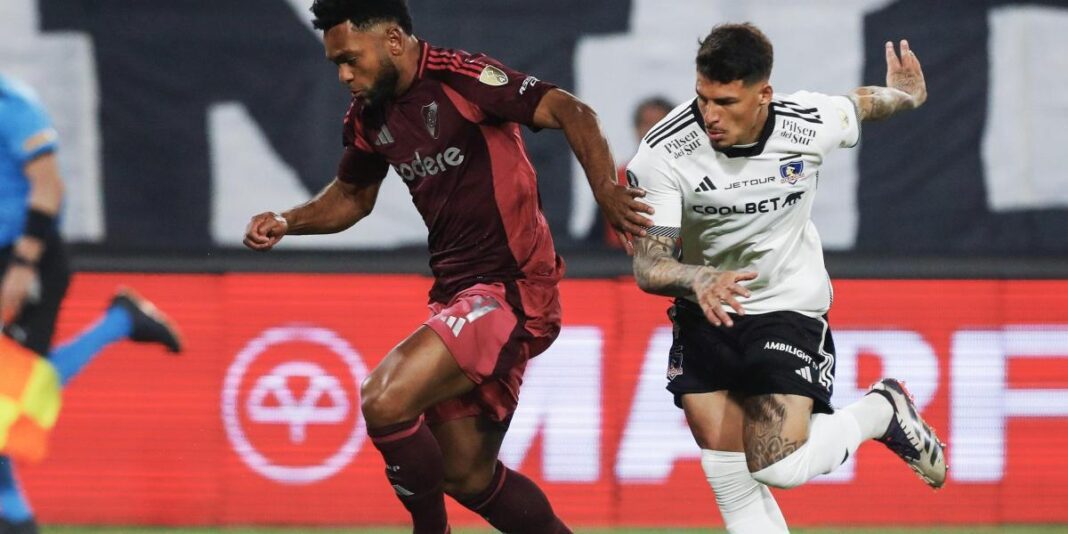BTN News: The first leg of the 2024 Copa Libertadores quarterfinals between Colo Colo and River Plate has ignited a heated controversy following a contentious challenge by River’s Colombian striker Miguel Ángel Borja. In a match filled with tension, a tackle made by Borja on Colo Colo defender Emiliano Amor in the 52nd minute has sparked widespread debate, particularly among fans of Colo Colo and Boca Juniors. The decision by referee Raphael Claus to not issue a red card, or even a yellow, has left many questioning the consistency of VAR and referee decisions in crucial matches.
The Tackle That Sparked the Controversy
Midway through the second half, Miguel Ángel Borja made a hard challenge on Emiliano Amor while attempting to win the ball. Instead of successfully reaching the ball, Borja’s studs landed forcefully on Amor’s ankle, leaving the Colo Colo defender in visible pain. Despite the severity of the challenge, referee Raphael Claus did not issue any card, and the VAR, led by Rodolpho Toski, chose not to intervene.
Fans of Colo Colo, led by club president Aníbal Mosa, were incensed by the decision, calling it a clear error. Mosa didn’t mince his words, labeling the incident as a “shame” and declaring that it was a blatant red-card offense. His frustrations echoed through the fanbase, particularly given the high stakes of the Copa Libertadores quarterfinals.
The Role of VAR in the Decision
In the days following the match, CONMEBOL released the audio from the VAR review of Borja’s challenge. According to the discussion between the on-field referee Claus and VAR official Toski, the challenge was deemed “low intensity” and classified as a “reckless action” worthy of a yellow card at most. However, under the current rules, VAR cannot intervene for yellow-card offenses, only for incidents that warrant a straight red card.
This explanation did little to calm the frustrations of Colo Colo supporters, who believed that Borja’s tackle deserved harsher punishment. Mosa, along with many fans, argued that the inconsistency in officiating was unacceptable in a tournament of this magnitude.
Boca Juniors Fans Weigh In: The Advíncula Comparison
Interestingly, the outrage wasn’t limited to Colo Colo fans. Boca Juniors supporters also joined the discussion, drawing parallels to a similar incident involving their own player, Luis Advíncula. In a recent Copa Sudamericana match against Cruzeiro, Advíncula was shown a straight red card for a tackle that Boca fans claim was no more severe than Borja’s challenge. Advíncula’s red card came just 29 seconds into the game, making it one of the fastest expulsions in tournament history. Boca fans took to social media to express their frustration, claiming double standards in South American officiating.
Breaking Down the VAR Protocol
To understand the controversy, it’s essential to revisit the specific instances in which VAR can intervene. According to the International Football Association Board (IFAB), the VAR is permitted to step in under the following four conditions:
- Goal or no goal decisions
- Penalty decisions
- Direct red card incidents
- Cases of mistaken identity
Since Borja’s challenge was deemed a yellow-card offense, VAR was unable to suggest a review, as it does not cover second yellow cards or actions viewed as reckless but not violent.
A Heated Response from Colo Colo’s Leadership
Aníbal Mosa, the president of Colo Colo, was particularly vocal following the game. In post-match interviews, Mosa described the lack of punishment for Borja as a “disgrace” and argued that such actions are “automatic red cards anywhere else in the world.” His comments underscored the growing frustration from South American clubs regarding the consistency of VAR and referee decisions in pivotal matches.
VAR’s Increasing Role in Football Debates
As technology continues to play an ever-larger role in football, controversies like the one surrounding Borja’s tackle are becoming more common. Supporters argue that while VAR was introduced to reduce errors, its selective application sometimes creates more questions than answers. The fact that different officiating crews interpret challenges differently only fuels fan dissatisfaction.
For Colo Colo, this quarterfinal result now feels tainted by a decision they view as unjust. For River Plate, the incident was just another physical aspect of a high-stakes game.
Conclusion: The Ongoing Debate Over Referee Consistency
The VAR controversy from the Colo Colo vs. River Plate clash is unlikely to fade quickly, particularly as the second leg approaches. For both teams, and for the broader fanbase across South America, the question of referee consistency remains a pressing issue in high-level tournaments like the Copa Libertadores.
As football fans and players alike call for greater accountability and clarity from officiating teams, it’s clear that the Borja tackle will be remembered as one of the defining moments of this year’s quarterfinals.


